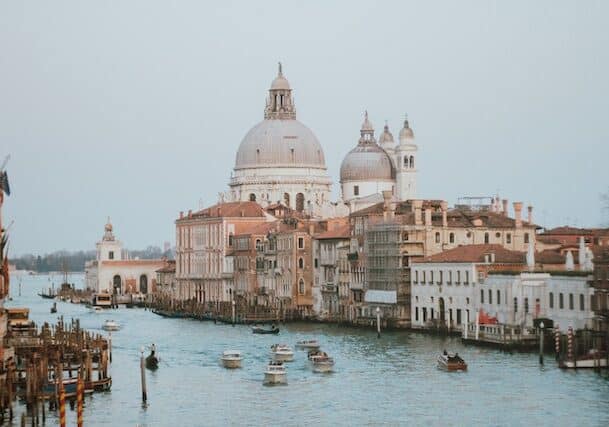
To relocate to Italy, you must apply for an appropriate Italian visa, which can then be converted into a residence permit. Alternatively, the investor visa offers eligible individuals the opportunity to live and work in Italy for up to two years.
This comprehensive guide covers everything you need to know about living in Italy, the pros and cons of moving, and practical tips to help you navigate Italian bureaucracy, legal obligations, and everyday life with confidence.
We will discuss:
- Why moving to Italy is a great idea
- Pro’s and con’s of living in Italy
- Things to know before moving to Italy
- Visa options
- Steps for relocating
- Taxes in Italy
Why Move to Italy?
1. A lifestyle that prioritizes well-being
Life in Italy is more relaxed. Time with family, good food, and a strong sense of community are all central to daily life.
2. Access to reliable healthcare
Italy offers both public and private healthcare. The national system (SSN) is affordable and accessible, while private insurance provides even more convenience and flexibility.
3. Deep cultural roots
Living in Italy means being surrounded by history, art, and tradition. Whether you’re in a historic city or a countryside village, the cultural experience is part of everyday life.
4. Flexible visa options
There are several ways to legally live in Italy. Options like the elective residency visa, investor visa, and the newly introduced digital nomad visa give people with different backgrounds a chance to move.
5. Affordable living in many areas
While places like Milan or Rome can be pricey, many towns and smaller cities offer a lower cost of living without compromising on quality.
6. Ideal location for travel
Italy’s central position in Europe makes it easy to travel across the continent, whether for business or leisure.
Italian Residency and Visa Requirements
Moving to Italy as an EU Citizen

If you plan to stay in Italy for over 90 days, you must register your residence with the local municipality (Comune) where you intend to live. This process involves submitting a residency declaration to the Anagrafe (Registry Office). Registration is needed to access various public services and to obtain an Italian identity card.
You’ll need:
- Valid Identification: A passport or national identity card.
- Proof of Employment or Financial Means: Evidence of employment, self-employment, or sufficient financial resources to support yourself during your stay.
- Health Insurance: Proof of comprehensive health coverage, either through the Italian public health system or private insurance.
- Proof of Address: A rental agreement, property deed, or a declaration of hospitality from a host.
Family members who are not EU citizens can accompany or join you in Italy. They must apply for a residence card at the local immigration office (Questura) within eight days of arrival. The application requires proof of the family relationship and your registered residency.
Moving to Italy as a non-EU citizen
If you’re planning to stay in Italy for more than 90 days and are not an EU citizen, you’ll need to apply for a visa that matches your purpose—whether it’s work, study, or joining family.
After arriving in Italy, you must apply for a residence permit (permesso di soggiorno) within eight days. After five years of legal residence, you may become eligible for permanent residency.
In the section below, we list some of the best visas for moving to Italy as a non-EU citizen.
Visa Options to Italy
Italy Digital Nomad Visa
Introduced in April 2024, the Italy Digital Nomad Visa allows highly skilled non-EU citizens to reside in Italy while working remotely for foreign employers or as freelancers. Key requirements include:
- Income Threshold: Applicants must demonstrate an annual income of at least €28000.
- Health Insurance: Comprehensive health insurance coverage for the duration of stay.
- Accommodation: Proof of accommodation in Italy.
- Professional Experience: At least six months of work experience as a digital nomad or remote worker.
- Validity: The visa is valid for up to one year and can be renewed if eligibility criteria are maintained.
Elective Residency Visa Italy
The Italy Elective Residency Visa is designed for financially independent individuals who do not plan to work in Italy. It’s ideal for retirees or those with passive income.
Key requirements include:
- Financial Means: Proof of stable income or savings to support yourself.
- Health Insurance: Comprehensive private coverage.
- Accommodation: Evidence of long-term housing in Italy.
- Employment Restriction: Work activities are not allowed under this visa.
- Validity: Typically valid for one year and renewable annually.
Italy Golden Visa (Investor Visa)
The Italy Golden Visa targets individuals intending to make significant financial investments in Italy. Eligible investments include:
- A minimum of €2 million in Italian government bonds.
- At least €500,000 in an Italian company.
- €250,000 in an Italian innovative startup.
- A philanthropic donation of €1 million to support projects of public interest.
Italy Self-Employment Visa
The Self-Employment Visa is suitable for freelancers, entrepreneurs, and business owners planning to work independently in Italy. Key requirements include:
- Business Plan: A detailed proposal of your professional activity.
- Financial Means: Proof of sufficient income or capital to support your work.
- Licenses/Authorizations: Registration with the appropriate professional body or chamber of commerce.
- Accommodation & Insurance: Proof of housing and private health insurance.
- Validity: Typically valid for one year and renewable.
Italy Student Visa
The Italy Student Visa is intended for non-EU citizens who have been accepted into a recognized educational institution in Italy. Key requirements include:
- Acceptance Letter: Proof of enrollment in a certified academic program.
- Financial Support: Evidence of funds to cover living expenses.
- Health Insurance: Valid health coverage for the duration of studies.
- Accommodation: Proof of housing arrangements.
- Work Permission: Part-time work allowed up to 20 hours per week.
- Validity: Aligned with the length of the academic program, renewable.
Things to Know Before Moving to Italy
Cost of living in different Italian cities
The cost of living in Italy varies significantly by location. Major cities like Rome, Milan, and Florence are among the most expensive, with higher costs for housing, dining, and transportation. For instance, a one-bedroom apartment in Milan’s city center averages around €1,370 per month. In contrast, southern regions and smaller towns offer a more affordable lifestyle. Overall, Italy’s cost of living is generally lower than that of the United States, making it an attractive option for expatriates seeking a balance between quality of life and expenses.
City | Rent (1 bedroom apt) | Utilities | Groceries (avg.) |
Rome | €1,140 | €190 | €250 |
Milan | €1,200 | €192 | €260 |
Naples | €815 | €198 | €220 |
Turin | €700 | €198 | €230 |
Florence | €900 | €196 | €240 |
Understanding the Italian healthcare system
Servizio Sanitario Nazionale (SSN)
Italy’s public healthcare system, the SSN, offers comprehensive medical services to citizens and legal residents. To access these services, individuals must register with their local Azienda Sanitaria Locale (ASL) office.
Upon registration, they receive a Tessera Sanitaria (health insurance card), granting access to a wide range of healthcare services. Non-EU nationals need legal residency to enroll in the SSN and may require private health insurance during the interim period.
Private Health Insurance
While the SSN provides extensive coverage, some residents choose private health insurance to access additional services, benefit from shorter waiting times, and have a broader selection of healthcare providers.
Private insurance plans can be tailored to individual needs, offering flexibility in choosing specialists and facilities. Private health insurance costs vary based on coverage and personal factors, with annual premiums ranging from approximately €100 to €300.
Safety in Italy
Italy is considered a safe country to live in, with a stable political environment and relatively low crime rates. According to the Global Peace Index 2024, Italy ranks among the top 40 most peaceful countries worldwide.
Healthcare, emergency services, and law enforcement are reliable. Residents have access to national emergency numbers, and police presence is strong in urban and rural areas.
Overall, Italy offers a secure environment for individuals, families, and retirees considering relocation.
Education in Italy
Italy’s education system is public, structured, and free for children aged 6 to 16. It includes primary, lower secondary, and upper secondary levels. Instruction is mainly in Italian, and the curriculum is set by the Ministry of Education.
International and private schools: Major cities like Rome, Milan, and Florence offer international schools in Italy that follow British, American, or IB programs. These are popular among expats and typically charge tuition.
Universities: taly has respected public and private universities. Public options are more affordable, especially for EU students. Some programs are available in English, mainly at the graduate level.
How to Move to Italy in 2025
Step 1: Gather all necessary documents:
- Valid Passport: Ensure your passport is up-to-date and will remain valid for the duration of your stay.
- Visa Application: Depending on your nationality and purpose of stay, apply for the appropriate visa at the Italian consulate in your home country.
- Permesso di Soggiorno (Residence Permit): Non-EU citizens planning to stay longer than 90 days must apply for this permit within eight days of arrival.
Step 2: Budget your expenses
- Cost of living: Research the cost of living in your chosen area, including housing, utilities, transportation, and groceries.
- Initial Expenses: Account for one-time costs such as visa fees, initial rent deposits, and furnishing your new home.
- Emergency Fund: Maintain a financial cushion to cover unexpected expenses during your transition.
Step 3: Find accommodation in Italy
- Research Locations: Consider factors such as proximity to work or study, public transportation, and local amenities.
- Temporary Housing: It may be beneficial to arrange temporary accommodation upon arrival to allow time for in-person property searches.
- Rental Agreements: Familiarize yourself with local rental laws and ensure you understand the terms before signing any contracts.
Step 4: Get a tax identification number
- Application Process: Visit the local Agenzia delle Entrate office with your passport and visa to apply. Some consulates allow you to obtain this before arriving in Italy.
- Usage: This number is required for employment, banking, signing leases, and accessing healthcare services.
Step 5: Open an Italian bank account
To open a bank account in Italy, you’ll need your passport, tax identification number (Codice Fiscale), proof of address, and sometimes a certificate of residence. It’s worth comparing banks to find the one that best matches your financial needs and language preferences.
Required Documents: Typically, you’ll need your passport, Codice Fiscale, proof of address, and proof of employment or study.
Bank Selection: Research various banks to find one that offers services aligning with your needs, such as online banking or English-speaking staff.
Some of the best banks in Italy for foreigners include Intesa Sao Paolo, UniCredit, Banco BPM and Mediobanca.
Taxes in Italy

Italy has a progressive income tax system (IRPEF) with rates ranging from 23% to 43%, depending on your income level. Regional and municipal taxes also apply, typically between 1.23%–3.33% and 0.1%–0.9%, respectively.
Corporate tax is set at 24%, with an additional 3.9% IRAP (regional production tax). The standard VAT (IVA) rate is 22%, with reduced rates for essentials.
Some newcomers may qualify for tax incentives like the “Decree of Growth,” which reduces income tax for the first five years of employment.
Income tax rates
Italy employs a progressive income tax system called Imposta sul Reddito delle Persone Fisiche (IRPEF). The tax rates for individuals are as follows:
- Up to €15,000: 23%
- €15,001 – €28,000: 27%
- €28,001 – €55,000: 38%
- €50,000 – €75, 000: 41%
- Over €75, 000: 43%
Additionally, regional income tax rates range from 1.23% to 3.33%, and municipal income tax rates vary between 0% and 0.9%, depending on the locality.
Tax incentives for expatriates
Italy offers specific tax regimes to attract foreign professionals and high-net-worth individuals:
- Impatriate Regime: As of January 2024, eligible individuals who become Italian tax residents can benefit from a 50% exemption on their employment income for up to five years, with a cap of €600,000 per year.
- Italy Flat Tax: New residents can opt for a substitute tax of €100,000 on foreign-sourced income per fiscal year in lieu of the standard progressive tax rates.
Wealth and property taxes
- Real Estate: A tax rate of 0.76% applies to the value of real estate properties owned outside Italy.
- Financial Assets: A tax rate of 0.2% applies to the value of financial investments held abroad.
Double taxation agreements
Italy has treaties with numerous countries to prevent double taxation, allowing foreign taxes paid to be credited against Italian tax liabilities. It’s essential to review the specific provisions of these agreements to understand their impact on your tax situation.
Moving to Italy Pros and Cons
Pros of moving to Italy
- High Quality of Life: Italy offers a relaxed lifestyle emphasizing family, community, and well-being.
- Cultural Richness: From world-renowned art and architecture to traditional festivals and regional cuisine, Italian culture is deeply immersive and diverse.
- Cost of Living: Compared to many European countries and major U.S. cities, the cost of living in Italy—especially in small towns—is often more affordable.
- Public and Private Healthcare: The public healthcare system is well-established and inexpensive. Many expats also choose private healthcare for added comfort and shorter wait times.
- Visa Flexibility: Italy offers a variety of options like the elective residency visa, investor visa, and the new digital nomad visa to suit different personal and professional needs.
- Central European Location: Living in Italy provides easy access to other EU countries, making it ideal for travel and cross-border work.
Cons of moving to Italy
- Bureaucracy: Administrative processes can be slow and complex, particularly when applying for a residence permit, registering your Italian bank account, or dealing with Italian tax matters.
- Language Barrier: While English is spoken in tourist areas and larger cities, knowing how to speak Italian is crucial for handling daily tasks and integrating socially.
- Job Market Limitations: Finding work can be difficult for non-EU citizens without sponsorship or a specialized skill set. Many sectors also have high competition and lower salaries compared to other countries.
- Tax Implications: Italy’s taxation system includes various income, regional, and municipal taxes. Residents are taxed on their worldwide income, and double taxation can be a concern without proper planning.
- Housing Market Challenges: In popular Italian cities, rental demand can be high, and the process of securing housing can be competitive, requiring all the proper documentation upfront.
Best Places to Live in Italy
- Rome – Italy’s capital, rich in culture and history.
Rome has ancient landmarks and modern amenities, with strong job opportunities in tourism, international organizations, and government. It’s a popular choice for expats seeking an active urban lifestyle. - Florence – A favorite for artists, students, and creatives.
Home to world-class art institutions and cultural scenes, Florence is ideal for those pursuing education or careers in design, fine arts, and heritage management. - Milan – The country’s financial and fashion hub.
Milan is a fast-paced city with strong industries in finance, tech, and design. It’s a prime location for international business and well-connected for travel across Europe. - Bologna – Known for its academic institutions and livability.
Bologna has one of the oldest universities in the world and offers a high quality of life, a strong public transport system, and a growing reputation as a startup hub. - Naples or Bari – More affordable options in southern Italy.
These cities offer a lower cost of living, rich cultural traditions, and a slower pace of life. They’re increasingly attractive to remote workers and retirees seeking true Italian living without the high urban costs.
How to find a Job in Italy
Job opportunities in Italy vary by region and industry. Northern cities like Milan, Turin, and Bologna offer more roles in finance, tech, and manufacturing, while central and southern areas have fewer openings and more competition.
EU citizens can work without restrictions. Non-EU citizens must secure a job offer and apply for a work visa through Italy’s annual quota system (decreto flussi), which limits the number of foreign workers allowed each year.
Most jobs require fluency in Italian, especially in local businesses or public-facing roles. However, international companies and some sectors—like tech, education, and tourism—may offer positions in English.
Permanent Residency and Citizenship in Italy
After legally residing in Italy for five years, you may apply for permanent residency, granting indefinite stay rights and access to additional benefits. Furthermore, after four years of legal residence, EU citizens may be eligible to apply for Italian citizenship, subject to meeting specific criteria.
Frequently Asked Questions about Moving to Italy
What do I need to know before moving to Italy?
You must understand visa requirements, register for a residence permit, and prepare for cultural and language differences. Key steps include applying for the correct visa, obtaining a Codice Fiscale, finding accommodation, and setting up healthcare and banking services.
How difficult is it to move to Italy?
Moving to Italy is manageable with proper planning. The most challenging aspects are dealing with bureaucracy, gathering proper documentation, and navigating the Italian language. Working with experienced professionals can simplify the process.
What is the cost of living in Italy?
The cost of living in Italy varies by region. Northern cities like Milan are more expensive, while southern and small towns offer a more affordable lifestyle. Expect monthly costs for a single person to range between €1,200–€2,000 depending on location and lifestyle.
How do I find accommodation in Italy?
You can find housing through online portals, real estate agencies, or word-of-mouth. Start with short-term rentals or serviced apartments while you search for long-term options. Be prepared to show your Codice Fiscale, ID, and proof of income.
Can I move to Italy without a job?
Yes, it’s possible if you qualify for a visa that doesn’t require employment, such as the elective residency visa or investor visa. However, you must prove sufficient income and obtain private health insurance.
Can I get Italian residency if I move there?
Yes, you can apply for Italian residency after entering Italy with a valid long-stay visa. You’ll need to register with your local Comune, obtain a residency permit, and show proof of address, income, and health coverage.
How do I open a bank account in Italy?
To open an Italian bank account, you’ll need your passport, Codice Fiscale, proof of address, and sometimes a residency permit. Some banks may also ask for proof of income or employment.
What is the healthcare system like in Italy?
Italy’s public healthcare system (SSN) is available to all legal residents and offers quality care at a low cost. Many expats also choose private health insurance for faster access and additional services.
How do I bring my pet when moving to Italy?
To bring a pet, you’ll need a valid passport for animals, proof of microchipping, and up-to-date rabies vaccinations. Pets from non-EU countries also require a health certificate issued within 10 days of travel and may be subject to additional checks upon arrival.
How to move to Italy from the UK?
UK citizens intending to reside in Italy for more than 90 days must obtain a relevant visa before traveling. Common visa categories include:
- Elective Residency Visa
- Work Visa:
- Self-Employment Visa
- Student Visa
Applications for these visas should be submitted to the Italian Consulate in the UK prior to departure.
Do UK citizens need a visa to live in Italy?
As of January 2021, UK nationals are considered non-EU citizens. For short stays up to 90 days within a 180-day period, no visa is required for purposes such as tourism, business meetings, or short-term studies. However, for stays exceeding 90 days, a visa appropriate to the purpose of stay is mandatory.
How to move to Italy from the US?
U.S. citizens can travel to Italy without a visa for up to 90 days within a 180-day period for tourism or business purposes. For stays longer than 90 days, you must apply for the appropriate Italian visa before entering the country.
After entering Italy with a long-stay visa, you must apply for a residence permit (permesso di soggiorno) within eight days at the local immigration office.



